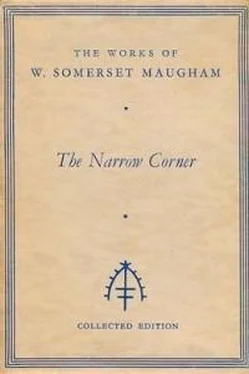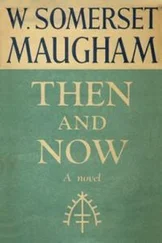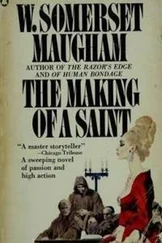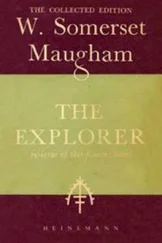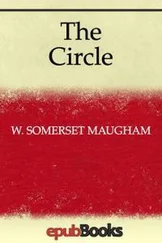“These are Christessen’s friends,” said her father as they came up to her.
She did not hold out her hand, but slightly and graciously inclined her head as first the doctor and then Captain Nichols were introduced to her. She gave them both a cool survey in which was inquiry and then swift appraisement. Dr. Saunders noticed that her brown hands were long and slender. Her eyes were blue. Her features were fine and very regular. She was an extremely pretty young woman.
“I’ve just been having a bathe in the pool,” she said.
Her glance travelled to Erik, and she gave him a very sweet and friendly smile.
“This is Fred Blake,” he said.
She turned her head a little to look at him, and for an appreciable time her eyes rested on him. The smile died away on her lips.
“Pleased to meet you,” said Fred, holding out his hand.
She continued to look at him, not with pertness or brazenly, but as though she were a little surprised. You might have thought she had seen him before and was trying to remember where. But the incident lasted no more than a minute, and no one would have been conscious of a pause before she took the proffered hand.
“I was just going back to the house to dress,” she said.
“I’ll come with you,” said Erik.
Now that he stood beside her you saw that she was not really very tall; it was only her straightness of limb, her slenderness and her carriage, that gave the impression of more than common height.
They sauntered back towards the house.
“Who is that boy?” she asked.
“I don’t know,” answered Erik. “He’s in partnership with the thin, grey one. They’re looking for pearl shell. They’re trying to find some new beds.”
“He’s good–looking.”
“I thought you’d like him. He’s got a nice nature.”
The others continued their tour of the estate.
WHEN they came in they found Erik sitting alone with Swan. The old man was telling an interminable story, in an odd mixture of Swedish and English, of some adventure he had had in New Guinea.
“Where’s Louise?” asked Frith.
“I’ve been helping her to lay the table. She’s been doing something in the kitchen and now she’s gone to change.”
They sat down and had another drink. They talked somewhat desultorily, as people do when they don’t know one another. Old Swan was tired, and when the strangers appeared lapsed into silence, but he watched them, with his sharp, rheumy eyes, as though they filled him with suspicion. Captain Nichols told Frith that he was a martyr to dyspepsia.
“I’ve never known what it is to have a pain in my tummy,” said Frith. “Rheumatism’s my trouble.”
“I’ve known men as was martyrs to it. A friend of mine at Brisbane, one of the best pilots in the business, was just crippled by it. Had to go about on crutches.”
“One has to have something,” said Frith.
“You can’t ’ave anythin’ worse than dyspepsia, you take my word for it. I’d be a rich man now if it ’adn’t been for my dyspepsia.”
“Money’s not everything,” said Frith.
“I’m not sayin’ it is. I’m sayin’ I’d ’ave been a rich man to–day if it ’adn’t been for my dyspepsia.”
“Money’s never meant anything very much to me. So long as I have a roof over my head and three meals a day I’m content. Leisure’s the important thing.”
Dr. Saunders listened to the conversation. He could not quite place Frith. He spoke like an educated man. Though fat and gross, shabbily dressed and in want of a shave, he gave the impression, scarcely of distinction, but of being accustomed to the society of decent people. He certainly did not belong to the same class as old Swan and Captain Nichols. His manners were easy. He had welcomed them with courtesy and treated them not with the fussy politeness an ill–bred person thinks it necessary to use towards strange guests, but naturally, as though he knew the ways of the world. Dr. Saunders supposed that he was what in the England of his youth they would have called a gentleman. He wondered how he had found his way to that distant island. He got up from his chair and wandered about the room. A number of framed photographs hung on the wall over a long book–case. He was surprised to find that they were of rowing eights of a Cambridge college, among which, though only by the name underneath, G. P. Frith, he recognised his host; others were groups of native boys at Perak in the Malay States, and at Kuching in Sarawak, with Frith, a much younger man than now, sitting in the middle. It looked as though on leaving Cambridge he had come to the East as a schoolmaster. The book–case was untidily stacked with books, all stained with damp and the ravages of the white ant, and these, with idle curiosity, taking out one here, one there, he glanced at. There was a number of prizes bound in leather from which he learned that Frith had been at one of the smaller public schools, and had been an industrious and even brilliant boy. There were the text–books that he had used at Cambridge, a good many novels, and a few volumes of poetry which gave the impression that they had been much read, but long ago. They were well–thumbed and many passages were marked in pencil or underlined, but they had a musty smell as though they had for years remained unopened. But what surprised him most was to see two shelves filled with works on Indian religion and Indian philosophy. There were translations of the Rig–Veda and of certain of the Upanishads, and there were paper–bound books published in Calcutta or Bombay by authors with names odd to him and with titles that had a mystical sound. It was an unusual collection to find in the house of a planter in the Far East, and Dr. Saunders, trying to make something of the indications they afforded, asked himself what sort of man they suggested. He was turning the pages of a book by one Srinivasa Iyengar called “Outlines of Indian Philosophy,” when Frith somewhat heavily limped up to him.
“Having a look at my library?”
“Yes.”
He glanced at the volume the doctor was holding.
“Interesting. Those Hindus, they’re marvellous; they have a natural instinct for philosophy. They make all our philosophers look cheap and obvious. Their subtlety is so amazing. Plotinus is the only fellow I know to compare with them.” He replaced the book on a shelf. “Of course, Brahma is the only religion that a reasonable man can accept without misgiving.”
The doctor gave him a sidelong glance. With his red, round face, and that long yellow tooth hanging loose in his jaw, his baldish head, he had none of the look of a man with spiritual leanings. It was surprising to hear him talk in this strain.
“When I consider the universe, those innumerable worlds and the vast distances of interstellar space, I cannot think it the work of a creator, and if it were, then I am forced to ask who or what created the creator. The Vedanta teaches that in the beginning was the existent, for how could the existent be born from the non–existent? And this existent was Atman, the supreme spirit, from whom emanated maya, the illusion of the phenomenal world. And when you ask those wise men of the East why the supreme spirit should have sent forth this phantasmagory they will tell you it was for his diversion. For being complete and perfect, he could not be actuated by aim or motive. Aim and motive imply desire and he that is perfect and complete needs neither change nor addition. Therefore the activity of the eternal spirit has no purpose, but like the frolic of princes or the play of children, is spontaneous and exultant. He sports in the world, he sports in the soul.”
“That is an explanation of things that does not entirely displease me,” the doctor murmured, smiling. “There is a futility about it that gratifies the sense of irony.”
Читать дальше
Конец ознакомительного отрывка
Купить книгу
